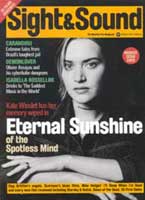
May 2004
Please view our back issues page for more information about obtaining previous months issues, dating back to 1995.
Features
 Eat My Shorts
Eat My Shorts
Has DV's cheapness and accessibility ushered in a new golden age for short films? And where do you find the money to take your project further, asks James Bell.
 Stop Making Sense
Stop Making Sense
Olivier Assayas' Demonlover was booed at cannes by critics who said it made no sense. Perhaps that's the idea argues Jonathan Romney.
 Olivier Assayas Power Games
Olivier Assayas Power Games
The director talks to David Thompson about S&M, capitalism and why Don DeLillo matters.
Protect and Survive
Like Kiss of the Spider Woman, Hector Babenco's Carandiru is set in a Brazilian prison. But this time he plays it for real, he tells Ali Jaafar.
I Forgot To Remember To Forget
Scrambling memory and time have become key conceits for contemporary film-makers. Nick James asks what movies like the Charlie Kaufman-scripted Eternal Sunshine of the Spotless Mind tell us about our collective fear and desire for amnesia. Plus Director Michel Gondry talks to Sheila Johnston about Jim Carrey's most chaotic shoot.
Cheap Wigs And Arsenic
Guy Maddiris The Saddest Music in the World is a return to form by one of Canada's most idiosyncratic directors. He tells Michael Brooke why Isabella Rossellini's glass legs and fake fur turned him on.
Break Dancing
Changes to tax law introduced in February are said to spell disaster for British cinema. Geoffrey Macnab uncovers the truth behind the rhetoric and looks to the future.
Selected reviews
 Film of the Month: I'll Sleep When I'm Dead
Film of the Month: I'll Sleep When I'm Dead
Mike Hodges' I'll Sleep When I'm Dead has a hard man out to avenge his brother's death. Its similarity to Get Carter ends there, says Ryan Gilbey.
Reviews in this issue:
- All Tomorrow's Parties
- Ash Wednesday
- Barbershop 2 Back in Business
- The Basque Ball Skin against Stone
- Blind Flight
- Bus 174
- The Butterfly Effect
- The Company
- Dawn of the Dead
- Demonlover
- The Deserted Station
- Les Diables
- Do I Love you?
- Eternal Sunshine of the Spotless Mind
- 50 First Dates
- Hidalgo
- The Honeymooners
- Film of the Month: I'll Sleep When I'm Dead
- Monsieur N
- Monsters Unleashed
- The Other Side of the Bed
- Pas sur la Bouche
- The Saddest Music in the World
- Scooby-Doo 2
- Secret Window
- Shaun of the Dead
- Song for a Raggy Boy
- Starsky & Hutch
- Strange Gardens
- Taking Lives
- The Twilight Samurai
- Uptown Girls
- Win a Date with Tad Hamilton!
- Wondrous Oblivion

 Pas sur la Bouche
Pas sur la Bouche Shaun of the Dead
Shaun of the Dead